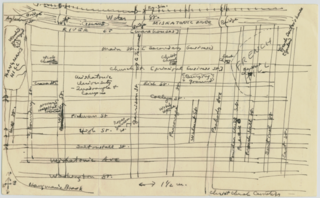
Arkham is a fictional city situated in Massachusetts, United States. An integral part of the Lovecraft Country setting created by H. P. Lovecraft, Arkham is featured in many of his stories and those of other Cthulhu Mythos writers.

At the Mountains of Madness is a science fiction-horror novella by American author H. P. Lovecraft, written in February/March 1931. Rejected that year by Weird Tales editor Farnsworth Wright on the grounds of its length, it was originally serialized in the February, March, and April 1936 issues of Astounding Stories. It has been reproduced in numerous collections.

Randolph Carter is a recurring fictional character created by H. P. Lovecraft. The character first appears in "The Statement of Randolph Carter", a short story Lovecraft wrote in 1919 based on one of his dreams. An American magazine called The Vagrant published the story in May 1920. Carter appears in seven stories written or co-written by Lovecraft, and has since appeared in stories by other authors.
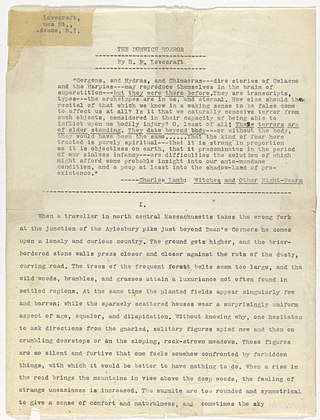
"The Dunwich Horror" is a horror novella by American writer H. P. Lovecraft. Written in 1928, it was first published in the April 1929 issue of Weird Tales (pp. 481–508). It takes place in Dunwich, a fictional town in Massachusetts. It is considered one of the core stories of the Cthulhu Mythos.

"Pickman's Model" is a short story by H. P. Lovecraft, written in September 1926 and first published in the October 1927 issue of Weird Tales.

Lovecraft Country is a term coined for the New England setting used by H. P. Lovecraft in many of his weird fiction stories, which combines real and fictitious locations. This setting has been elaborated on by other writers working in the Cthulhu Mythos. The phrase was not in use during Lovecraft's own lifetime; it was coined by Keith Herber for the Lovecraftian role-playing game Call of Cthulhu.

Lovecraftian horror, also called cosmic horror or eldritch horror, is a subgenre of horror, fantasy fiction and weird fiction that emphasizes the horror of the unknowable and incomprehensible more than gore or other elements of shock. It is named after American author H. P. Lovecraft (1890–1937). His work emphasizes themes of cosmic dread, forbidden and dangerous knowledge, madness, non-human influences on humanity, religion and superstition, fate and inevitability, and the risks associated with scientific discoveries, which are now associated with Lovecraftian horror as a subgenre. The cosmic themes of Lovecraftian horror can also be found in other media, notably horror films, horror games, and comics.

The Shadow Out of Time is a novella by American horror fiction writer H. P. Lovecraft. Written between November 1934 and February 1935, it was first published in the June 1936 issue of Astounding Stories. The story describes time and space travel by mind transfer, where a person in a given place and time can switch bodies with someone who is elsewhere or elsewhen. As with other Lovecraftian works, this story features otherworldly alien beings that are not simply variations on humans or other familiar terrestrial animals.

"From Beyond" is a horror genre short story by American writer H. P. Lovecraft. It was written in 1920 and was first published in The Fantasy Fan in June 1934.
"The Dreams in the Witch House" is a horror short story by American writer H. P. Lovecraft, part of the Cthulhu Mythos cycle. It was written in January/February 1932 and first published in the July 1933 issue of Weird Tales.

"Herbert West–Reanimator" is a horror short story by American writer H. P. Lovecraft. It was written between October 1921 and June 1922. It was first serialized in February through July 1922 in the amateur publication Home Brew. The story was the basis of the 1985 horror film Re-Animator and its sequels, in addition to numerous other adaptations in various media.
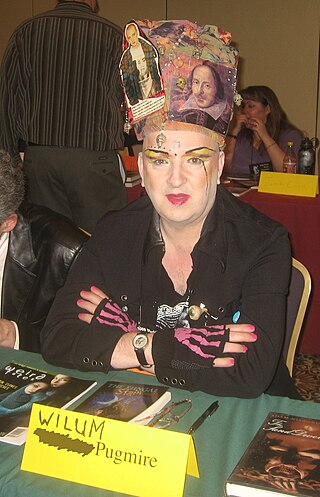
Wilum Hopfrog Pugmire, was a writer of weird fiction and horror fiction based in Seattle, Washington. His works typically were published as W. H. Pugmire and his fiction often paid homage to the lore of Lovecraftian horror. Lovecraft scholar and biographer S. T. Joshi described Pugmire as "the prose-poet of the horror/fantasy field; he may be the best prose-poet we have" and as one of the genre's leading Lovecraftian authors.
The H. P. Lovecraft Historical Society or HPLHS is the organization that hosts Cthulhu Lives!, a group of live-action roleplayers for the Cthulhu Live version of Call of Cthulhu. Founded in Colorado in 1984, it is now based in Glendale, California. Their motto is Ludo Fore Putavimus.
Shadow of the Unnamable is a multi award winning short film by German director Sascha Alexander Renninger. It is based on H. P. Lovecraft's short story The Unnamable (1923). It had its premiere in 2011 at the H.P. Lovecraft Film Festival in Los Angeles, California, USA. There it won its first award, Best Short Lovecraft Adaptation.

Meddling Kids is a 2017 horror-comedy novel by Catalan author Edgar Cantero, published by Doubleday and Blumhouse Books. It deals with a former gang of children detectives, in the vein of Enid Blyton's Famous Five or Scooby-Doo, who reunite in their mid-twenties to reopen a case that traumatized them as kids and expose a plot of Lovecraftian horror.
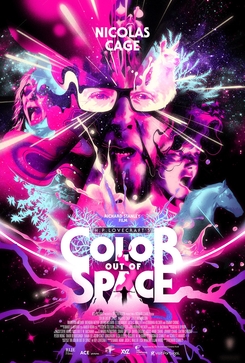
Color Out of Space is a 2019 American science fiction Lovecraftian horror film directed and co-written by Richard Stanley, based on the short story "The Colour Out of Space" by H. P. Lovecraft. It stars Nicolas Cage, Joely Richardson, Elliot Knight, Madeleine Arthur, Brendan Meyer, Q'orianka Kilcher and Tommy Chong. This is Stanley's first feature film since his firing from The Island of Dr. Moreau (1996). According to Stanley, it is the first film in a trilogy of Lovecraft adaptations, which he hopes to continue with an adaptation of "The Dunwich Horror".
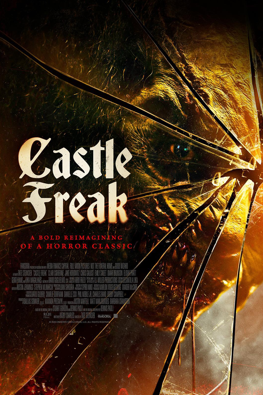
Castle Freak is a 2020 American direct-to-video horror film that was directed by Tate Steinsiek. It has been billed as a reboot of the 1995 Stuart Gordon film by the same name, which is a loose adaptation of the stories "The Outsider" and "The Dunwich Horror" by H.P. Lovecraft.
The Resonator, also known by the title of its first arc, The Resonator: Miskatonic U as well as Miskatonic U, is an American web series written and directed by William Butler and loosely based upon the works of H. P. Lovecraft. The series is also based on the Lovecraft adaptations by director Stuart Gordon. Initially released as a series of web-released episodes beginning in 2021, the six-episode series was collected into a single movie and released by Full Moon Entertainment in 2022.
H.P. Lovecraft's Witch House is a 2021 American horror film directed by Bobby Easley, starring Portia Chellelynn, Julie Anne Prescott, Andrea Collins, Erin Trimble, Solon Tsangaras and John Johnson. It is a loose adaptation of H. P. Lovecraft's The Dreams in the Witch House.














